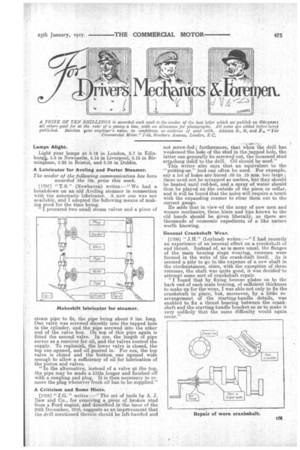A PRIZE OF TEN SHILLINGS is awarded each week to
Page 25

If you've noticed an error in this article please click here to report it so we can fix it.
the sender of the best letter which ure" publish ma this-page: all others paid for at the rateof a penny, a tine, with an allowance for photographs. AN notes are edited before being publighed. Mention your employer's name, in confidence, as evidence of good raith. Address D., 31, and F., 44 The Commercial Motor," 7-15. Rosebery Avenue, London, E C.
Lamps Alight.
Light your lamps at 5.12 in London, 5.7 in Edinburgh, 5.5 in Newcastle, 5.14 in Liverpool, 5.15 in Birmingham, 5.22 in Bristol, and 5.59 in Dublin.
A Lubricator for Aveling and Porter Steamer.
The sender of the following communication. has been. awarded the 10s. prize this week.
[1707] "T.S." (Newhaven) writes :—" We had a breakdown on an old Aveling steamer in connection with the automatic lubricator. A new one was not available, and I adopted the following means of making good for the time being. I procured two small steam valves and a piece of steam pipe to fit, the pipe being about 8 ins. long. One valve was screwed directly into the tapped hole in the cylinder, and the _pipe screwed into the other end of the valve box_ On top of this _pipe again is fitted the second valve. In use, the length of pipe serves as a receiver for oil, and the valves control the supply. To replenish, the lower valve is closed, the top one opened, and oil poured in. For use, the top valve is closed and the bottom one opened wide enough to allow a sufficiency of oil for lubrication, of the laden and valves.
"In the alternative, instead of a valve at the top, the pipe. may be made a little longer and finished off with a coupling and plug. It is then necessary to remove the plug whenever fresh oil has to be supplied."
A Criticism and Some Hints.
[1708] " J.G. " writes :—" The set of tools by A. J. Dew and Co., for removing a piece of broken stud from a Ford engine, and described in' the issue of the 28th December, 1916, suggests as an improvement that the drill mentioned therein should be left-handed and not screw-fed ; furthermore, that when the drill has weakened the hole el the stud in the ,tapped hole, the latter can generally be screwedout, the loosened stud attaching itself to the drill. Oil should be used."
This writer also says that an 'equivalent to the " putting-on " tool can often be used. For example, say a lot of holes are bored .05 to .15 mm. too large ; these need not be scrapped as useless, but they should be heated until red-hot, and a spray of water should then be played on the outside of the piece or collar, and it will be found that the holes will require a touch with the expanding reamer to clear them out to the correct gauge. Ile adds that in view of the army of new men and women mechanics, these hints and tips known to the old hands should be given liberally, as ttiere are thousands of economic expedients of a like nature worth knowing_ Unusual Crankshaft Wear.
[1709] " J.H." (Leyland) writes :—" I had recently an experience of an unusual effect on a crankshaft of end thrust. Instead of, as is more usual, the flanges of the main bearing steps wearing, recesses were formed in the webs of the crankshaft itself. As it seemed a pity to go to the expense of a new shaft in the circumstances, since, with the exception of these recesses, the shaft was quite good, it was decided' to attempt some sort of crankshaft repair.
"I found that by fixing bronze plates on to the back end of each main bearing, of sufficient thickness to make up for the wear, I was able not only to fix the crankshaft in place, but, moreover, by a little rearrangement of the starting-handle details, was enabled to fix a thrust bearing between the crankshaft and the starting-handle bracket so as to make it very unlikely that the same difficulty would again occur."


























